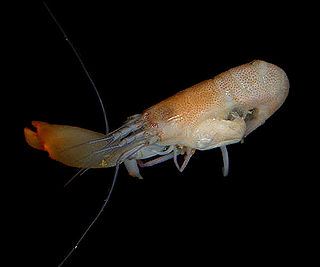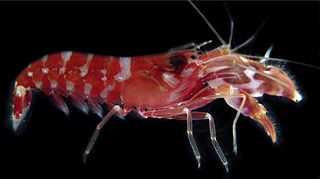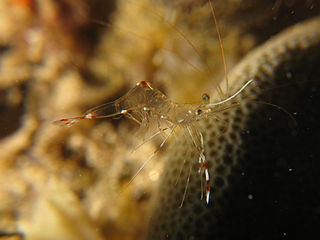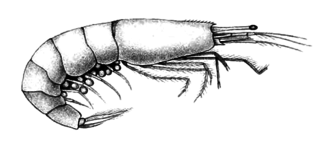
The Caridea, commonly known as caridean shrimp or true shrimp, are an infraorder of shrimp within the order Decapoda. This infraorder contains all species of true shrimp. They are found widely around the world in both fresh and salt water. Many other animals with similar names – such as the mud shrimp of Axiidea and the boxer shrimp of Stenopodidea – are not true shrimp, but many have evolved features similar to true shrimp.
Alpheopsis is a genus of shrimp of the family Alpheidae. Several species of the genus have been known to share the same burrows with members of different species. They are inhabitants of the eastern Pacific Ocean.

Synalpheus is a genus of snapping shrimp of the family Alpheidae, presently containing more than 100 species; new ones are described on a regular basis, and the exact number even of described species is disputed.

Palaemonidae is a family of shrimp in the order Decapoda. Many species are carnivores that eat small invertebrates, and can be found in any aquatic habitat except the deep sea. One significant genus is Macrobrachium, which contains commercially fished species. Others inhabit coral reefs, where they associate with certain invertebrates, such as sponges, cnidarians, mollusks, and echinoderms, as cleaner shrimps, parasites, or commensals. They generally feed on detritus, though some are carnivores and hunt tiny animals.

Palaemon is a genus of caridean shrimp in the family Palaemonidae.

Procaris is a genus of shrimp in the family Procarididae. It contains the following species:
Raymond Brendan Manning was an American carcinologist, specialising in alpha taxonomy and mantis shrimp.
Fenner Albert Chace Jr. was an American carcinologist.

Lysmata is a genus of shrimp in the infraorder Caridea, the caridean shrimp. The genus belongs to the family Lysmatidae. Lysmata are popular ornamental shrimp in the marine aquarium trade for their bright color patterns, interesting behaviors, and ability to control certain aquarium pests such as sea anemones of the genus Aiptasia. They are known to command high prices on the pet market.

Alpheoidea is a superfamily of shrimp. Species of shrimp in the superfamily Alpheoidea are drag swimmers, as opposed to lift swimmers.

Cuapetes is a genus of shrimp in the family Palaemonidae, first described by Austin Hobart Clark in 1919. WoRMS accepts the following species:

Ancylomenes is a genus of shrimp, erected in 2010 to accommodate the group of species around "Periclimenes aesopius". Members of the genus are widely distributed in the warm oceans of the world, and live in association with cnidarians; most are cleaner shrimp.

Urocaridella is a genus of shrimps comprising the following species:

Tuleariocaris is a genus of shrimp comprising the following species:

Ogyrididae is a family of decapod crustaceans consisting of 10 species.

Thoridae, also known as broken-back shrimp or anemone shrimp, is a family of cleaner shrimp.
Parhippolyte is a genus of cave dwelling decapod crustaceans, known as cave shrimps from the family Barbouriidae The type species Parhippolyte uveae was described in 1900 by the English carcinologist Lancelot Alexander Borradaile from specimens collected in the south western Pacific by Arthur Willey. As their vernacular name of cave shrimp suggests these species are generally found in marine caves as well as anchialine ponds and lagoons.

Periclimenes, commonly known as glass shrimp or cleaner shrimp, is a commensal and often symbiotic genus of semi-transparent shrimp within the family Palaemonidae. Species of this large genus feature a wide variety of coloration and patterns, widespread distribution throughout much of the world's tropical oceans, and are often sought out for aquarium trade.













